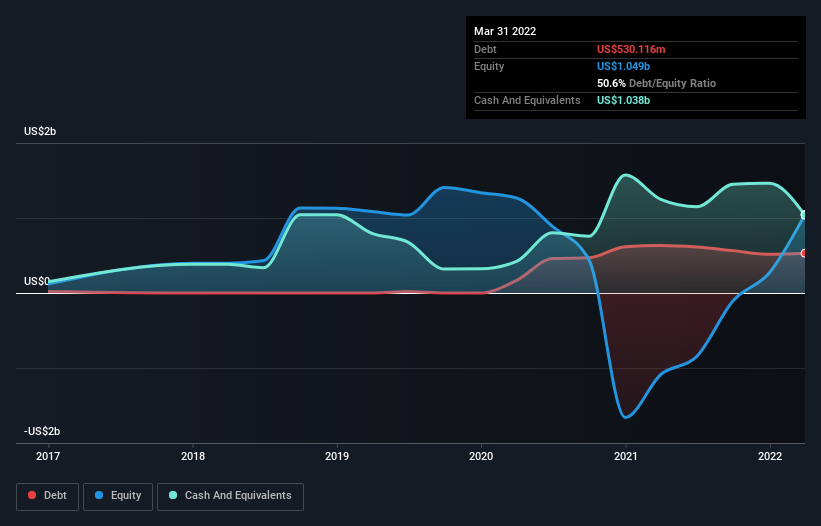The external fund manager backed by Berkshire Hathaway's Charlie Munger, Li Lu, makes no bones about it when he says 'The biggest investment risk is not the volatility of prices, but whether you will suffer a permanent loss of capital.' So it might be obvious that you need to consider debt, when you think about how risky any given stock is, because too much debt can sink a company. We can see that Farfetch Limited (NYSE:FTCH) does use debt in its business. But is this debt a concern to shareholders?
When Is Debt Dangerous?
Generally speaking, debt only becomes a real problem when a company can't easily pay it off, either by raising capital or with its own cash flow. Part and parcel of capitalism is the process of 'creative destruction' where failed businesses are mercilessly liquidated by their bankers. While that is not too common, we often do see indebted companies permanently diluting shareholders because lenders force them to raise capital at a distressed price. By replacing dilution, though, debt can be an extremely good tool for businesses that need capital to invest in growth at high rates of return. When we examine debt levels, we first consider both cash and debt levels, together.
See our latest analysis for Farfetch
What Is Farfetch's Net Debt?
As you can see below, Farfetch had US$530.1m of debt at March 2022, down from US$633.1m a year prior. But it also has US$1.04b in cash to offset that, meaning it has US$507.5m net cash.

How Strong Is Farfetch's Balance Sheet?
The latest balance sheet data shows that Farfetch had liabilities of US$865.6m due within a year, and liabilities of US$1.96b falling due after that. Offsetting this, it had US$1.04b in cash and US$437.4m in receivables that were due within 12 months. So its liabilities total US$1.35b more than the combination of its cash and short-term receivables.
Farfetch has a market capitalization of US$2.92b, so it could very likely raise cash to ameliorate its balance sheet, if the need arose. But we definitely want to keep our eyes open to indications that its debt is bringing too much risk. Despite its noteworthy liabilities, Farfetch boasts net cash, so it's fair to say it does not have a heavy debt load! When analysing debt levels, the balance sheet is the obvious place to start. But it is future earnings, more than anything, that will determine Farfetch's ability to maintain a healthy balance sheet going forward. So if you're focused on the future you can check out this free report showing analyst profit forecasts.
In the last year Farfetch wasn't profitable at an EBIT level, but managed to grow its revenue by 25%, to US$2.3b. Shareholders probably have their fingers crossed that it can grow its way to profits.
So How Risky Is Farfetch?
Although Farfetch had an earnings before interest and tax (EBIT) loss over the last twelve months, it made a statutory profit of US$1.7b. So taking that on face value, and considering the cash, we don't think its very risky in the near term. The good news for Farfetch shareholders is that its revenue growth is strong, making it easier to raise capital if need be. But we still think it's somewhat risky. There's no doubt that we learn most about debt from the balance sheet. But ultimately, every company can contain risks that exist outside of the balance sheet. To that end, you should learn about the 3 warning signs we've spotted with Farfetch (including 1 which is concerning) .
If you're interested in investing in businesses that can grow profits without the burden of debt, then check out this free list of growing businesses that have net cash on the balance sheet.
New: AI Stock Screener & Alerts
Our new AI Stock Screener scans the market every day to uncover opportunities.
• Dividend Powerhouses (3%+ Yield)
• Undervalued Small Caps with Insider Buying
• High growth Tech and AI Companies
Or build your own from over 50 metrics.
Have feedback on this article? Concerned about the content? Get in touch with us directly. Alternatively, email editorial-team (at) simplywallst.com.
This article by Simply Wall St is general in nature. We provide commentary based on historical data and analyst forecasts only using an unbiased methodology and our articles are not intended to be financial advice. It does not constitute a recommendation to buy or sell any stock, and does not take account of your objectives, or your financial situation. We aim to bring you long-term focused analysis driven by fundamental data. Note that our analysis may not factor in the latest price-sensitive company announcements or qualitative material. Simply Wall St has no position in any stocks mentioned.
About OTCPK:FTCH.Q
Farfetch
Operates a platform for the luxury fashion industry in the United States, the United Kingdom, and internationally.
Low risk with weak fundamentals.
Similar Companies
Market Insights
Weekly Picks


Ferrari's Intrinsic and Historical Valuation


Investment Thesis: Costco Wholesale (COST)

Undervalued Key Player in Magnets/Rare Earth
Recently Updated Narratives


Broadcom - A Fundamental and Historical Valuation


Hims & Hers Health aims for three dimensional revenue expansion


A Tale of Two Engines: Coca-Cola HBC (EEE.AT)
Popular Narratives


The "Sleeping Giant" Stumbles, Then Wakes Up


NVDA: Expanding AI Demand Will Drive Major Data Center Investments Through 2026





